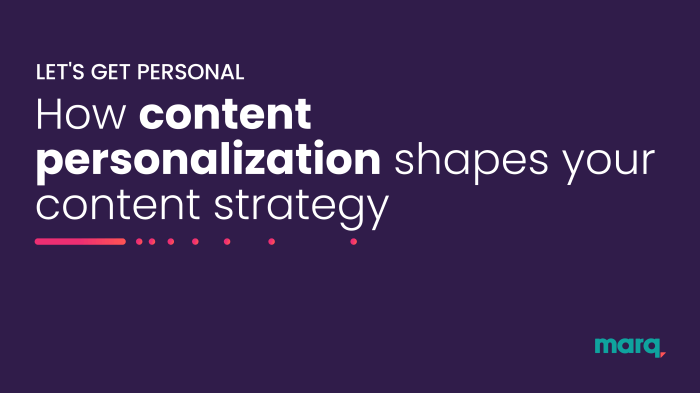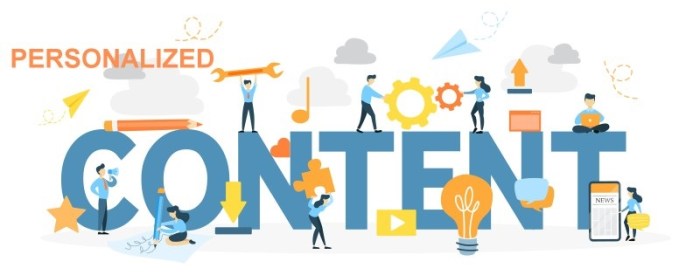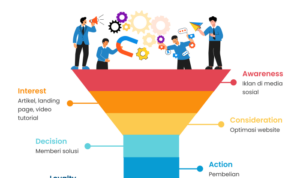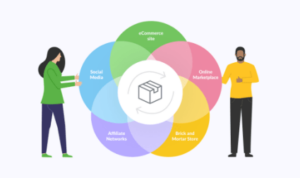Diving into Content Personalization Tips, we’re about to explore the ins and outs of tailoring your online content to the max. Get ready to revolutionize your digital game with these killer tips!
From boosting customer engagement to navigating the latest tech tools, this guide has got you covered. Let’s unlock the secrets to personalized content success!
Introduction to Content Personalization

Content personalization is the process of tailoring content and experiences to individual users based on their preferences, behavior, and demographics. This customization allows businesses to deliver more relevant and engaging content to their audience, ultimately leading to increased customer satisfaction, loyalty, and conversions.
Importance of Content Personalization
Content personalization is crucial for businesses in today’s digital landscape as it helps create a more personalized and targeted experience for users. By delivering content that resonates with individuals on a personal level, businesses can increase customer engagement, drive conversions, and build long-lasting relationships with their audience.
- Improved user experience: Personalized content helps users find the information they need more quickly and easily, leading to a better overall experience.
- Increased engagement: Tailored content is more likely to capture users’ attention and keep them interested in exploring further.
- Higher conversion rates: By delivering relevant content to users, businesses can drive conversions and increase sales.
Successful Content Personalization Strategies
Successful content personalization strategies often involve leveraging data analytics, AI, and machine learning to understand user behavior and preferences. Some examples of effective content personalization strategies include:
- Personalized recommendations based on past behavior and preferences, such as Amazon’s product recommendations or Netflix’s content suggestions.
- Dynamic content that changes based on user interactions, like personalized email campaigns or website landing pages.
- Segmentation of audiences to deliver targeted content to specific user groups, ensuring relevance and effectiveness.
Benefits of Content Personalization
Implementing content personalization can bring numerous benefits to businesses looking to enhance their customer engagement and drive conversions. By tailoring content to individual preferences and behaviors, companies can create a more personalized and relevant experience for their audience, ultimately leading to increased customer satisfaction and loyalty.
Improved Customer Engagement
Personalized content allows businesses to connect with their audience on a deeper level by delivering relevant and timely information that resonates with each individual. This targeted approach helps to capture the attention of customers, increase interaction with the brand, and foster a sense of connection and trust. As a result, personalized content can significantly boost customer engagement metrics such as click-through rates, time spent on site, and social media interactions.
- Personalized product recommendations can lead to a 10% increase in conversion rates.
- 80% of consumers are more likely to do business with a company that offers personalized experiences.
- Businesses that personalize their web experiences see an average of 19% increase in sales.
Strategies for Effective Content Personalization: Content Personalization Tips
Personalizing content is crucial in engaging users and driving conversions. To effectively personalize content, businesses can employ various strategies that involve collecting data, utilizing AI and machine learning, and creating dynamic content based on user behavior.
Collecting Data for Personalization, Content Personalization Tips
When it comes to collecting data for personalization, businesses can utilize various methods such as website analytics, user surveys, social media insights, and customer feedback. By gathering information on user preferences, behavior, demographics, and interactions, businesses can create tailored content that resonates with their audience.
- Utilize website analytics tools like Google Analytics to track user behavior, popular pages, and conversion metrics.
- Implement user surveys and feedback forms to gather direct input from customers regarding their preferences and interests.
- Monitor social media insights to understand how users engage with content and identify trends in their behavior.
- Utilize customer relationship management (CRM) systems to track customer interactions, purchases, and preferences.
The Role of AI and Machine Learning
AI and machine learning play a significant role in content personalization by enabling businesses to analyze large amounts of data, predict user behavior, and automate personalized content delivery. By leveraging AI algorithms, businesses can create personalized recommendations, product suggestions, and targeted marketing campaigns.
- Implement AI-powered tools like recommendation engines to provide personalized product suggestions based on user preferences and browsing history.
- Utilize machine learning algorithms to analyze user behavior patterns and predict future actions, allowing for proactive content personalization.
- Automate email marketing campaigns using AI to deliver personalized content to individual users based on their interactions and preferences.
Creating Dynamic Content Based on User Behavior
Dynamic content allows businesses to deliver personalized experiences in real-time based on user interactions and behavior. By tailoring content such as product recommendations, promotions, and messaging to individual users, businesses can enhance user engagement and drive conversions.
- Use dynamic content blocks on websites to display personalized recommendations, related products, and targeted offers based on user behavior.
- Implement personalized email campaigns that dynamically adjust content based on user interactions, preferences, and purchase history.
- Create dynamic landing pages that customize content based on user demographics, interests, and past interactions with the website.
Tools and Technologies for Content Personalization

In the realm of content personalization, there are several tools and technologies that marketers and businesses can leverage to create a more tailored and engaging experience for their audience. These tools help in analyzing user behavior, preferences, and demographics to deliver content that resonates with individual users on a more personal level.
Popular Tools and Platforms
- 1. Google Optimize: A powerful A/B testing and personalization platform that integrates seamlessly with Google Analytics to help marketers create and test personalized content.
- 2. Optimizely: Known for its experimentation platform, Optimizely allows businesses to test different variations of their content to determine the most effective personalized approach.
- 3. Adobe Target: A comprehensive personalization solution that enables marketers to deliver tailored content based on user data and behavior.
- 4. Dynamic Yield: An AI-powered personalization platform that helps businesses deliver individualized content experiences across channels.
Comparison of Personalization Software
- When comparing different personalization software options in the market, it is crucial to consider factors such as ease of use, customization capabilities, integration with other tools, scalability, and pricing.
- Google Optimize is favored for its seamless integration with Google Analytics, while Adobe Target is known for its robust personalization features.
- Optimizely stands out for its user-friendly interface and powerful experimentation capabilities, while Dynamic Yield excels in AI-driven personalization.
The Importance of A/B Testing
- A/B testing plays a vital role in optimizing personalized content by allowing marketers to test different variations and determine which one resonates best with their audience.
- By conducting A/B tests, businesses can gather valuable data on user preferences and behaviors, leading to more effective content personalization strategies.
- It enables marketers to make data-driven decisions, iterate on content variations, and continuously improve the personalized content delivery to drive engagement and conversions.
Challenges in Content Personalization
Implementing content personalization comes with its own set of challenges that businesses need to address in order to ensure successful customization for their audience. Let’s dive into some common challenges faced and strategies to overcome them, while also considering the ethical implications of data collection and usage in personalization efforts.
Data Privacy Concerns
One of the major challenges in content personalization is navigating the fine line between providing tailored experiences and respecting user privacy. With the increasing focus on data privacy regulations like GDPR, businesses need to ensure that they are transparent about the data they collect and how it is being used. Strategies to overcome this challenge include obtaining explicit consent from users before collecting data, anonymizing personal information, and being upfront about the benefits of personalized content.
Content Quality and Relevance
Another challenge is maintaining the quality and relevance of personalized content. As businesses strive to deliver customized experiences, there is a risk of overwhelming users with irrelevant or redundant information. To address this challenge, businesses can leverage advanced analytics tools to understand user preferences, behavior, and engagement patterns. By continuously analyzing and optimizing content based on user feedback and interactions, businesses can ensure that personalized content remains valuable and engaging.
Technical Integration
Integrating personalization technologies with existing systems and platforms can be a complex and time-consuming process. Businesses may face challenges in aligning data from various sources, implementing tracking mechanisms, and ensuring seamless delivery of personalized content across different channels. To overcome this challenge, businesses should invest in scalable and flexible personalization tools that can easily integrate with their existing infrastructure. Collaborating with IT and marketing teams to streamline the implementation process can also help in overcoming technical integration challenges.
Ethical Considerations
When collecting and using data for personalization, businesses must also consider the ethical implications of their actions. It is essential to prioritize user consent, data security, and transparency in data practices. By establishing clear data governance policies, conducting regular audits, and providing users with control over their data, businesses can build trust and credibility with their audience. Additionally, businesses should be mindful of potential biases in data collection and algorithms to ensure fair and unbiased personalization practices.





